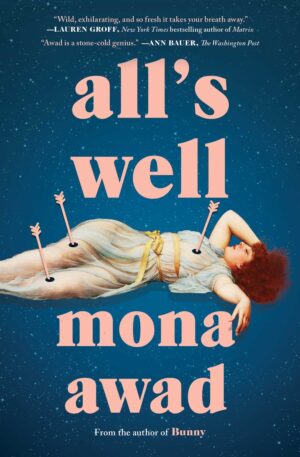This book was provided by the publisher for review purposes. All opinions are my own.
 All's Well: A Novel by Mona Awad
All's Well: A Novel by Mona AwadPublication Date: August 2, 2021
Publisher: S&S / Marysue Rucci Books / Simon & Schuster
Pages: 368
Goodreads
Source: From the Publisher
Genre: Fiction / Literary
Rating: ★★½
Synopsis:
From the author of Bunny, which Margaret Atwood hails as “genius,” comes a “wild, and exhilarating” (Lauren Groff) novel about a theater professor who is convinced staging Shakespeare’s most maligned play will remedy all that ails her—but at what cost?
Miranda Fitch’s life is a waking nightmare. The accident that ended her burgeoning acting career left her with excruciating chronic back pain, a failed marriage, and a deepening dependence on painkillers. And now, she’s on the verge of losing her job as a college theater director. Determined to put on Shakespeare’s All’s Well That Ends Well, the play that promised and cost her everything, she faces a mutinous cast hellbent on staging Macbeth instead. Miranda sees her chance at redemption slip through her fingers.
That’s when she meets three strange benefactors who have an eerie knowledge of Miranda’s past and a tantalizing promise for her future: one where the show goes on, her rebellious students get what’s coming to them, and the invisible doubted pain that’s kept her from the spotlight is made known.
With prose Margaret Atwood has described as “no punches pulled, no hilarities dodged…genius,” Mona Awad has concocted her most potent, subversive novel yet. All’s Well is a “fabulous novel” (Mary Karr) about a woman at her breaking point and a formidable, piercingly funny indictment of our collective refusal to witness and believe female pain.
REVIEW
I’m uncertain why this book is categorized as a thriller mystery or a dark comedy because it doesn’t fit into either genre. There is nothing thrilling or mysterious about it, and it certainly lacks any humour. Don’t get me wrong, it’s not a terrible book, but it’s not exceptional either.
The main character, Miranda, suffers from severe and debilitating pain that others dismiss as imaginary. This upset me because who are they to invalidate her pain? Consequently, her life falls apart. Her marriage ends, she relies heavily on pills, and she’s on the verge of losing her job. Witnessing her self-destruction reminded me of the book “Empire of Pain” and the millions of people struggling with opioid addiction due to chronic pain. It was overwhelmingly bleak.
Personally, I found the book uncomfortable and somewhat confusing. Watching Miranda deteriorate was distressing, as was seeing others dismiss her pain. However, it was perplexing to observe her sudden improvement the next day. Was it real or a hallucination? Despite empathizing with Miranda, she was incredibly annoying. She constantly complained about everything and everyone, hating practically everything. I understand she was in a difficult situation, but it seemed like she made her circumstances her entire identity. Anyone who didn’t fully agree with her became an enemy or someone out to harm her. Reading about her was mentally exhausting.
The ending left me largely unsatisfied. While some things were explained, many were left unresolved. I’m not a fan of ambiguity. I understand why Mona Awad chose this approach, but it didn’t quite work as a plot device in this case.